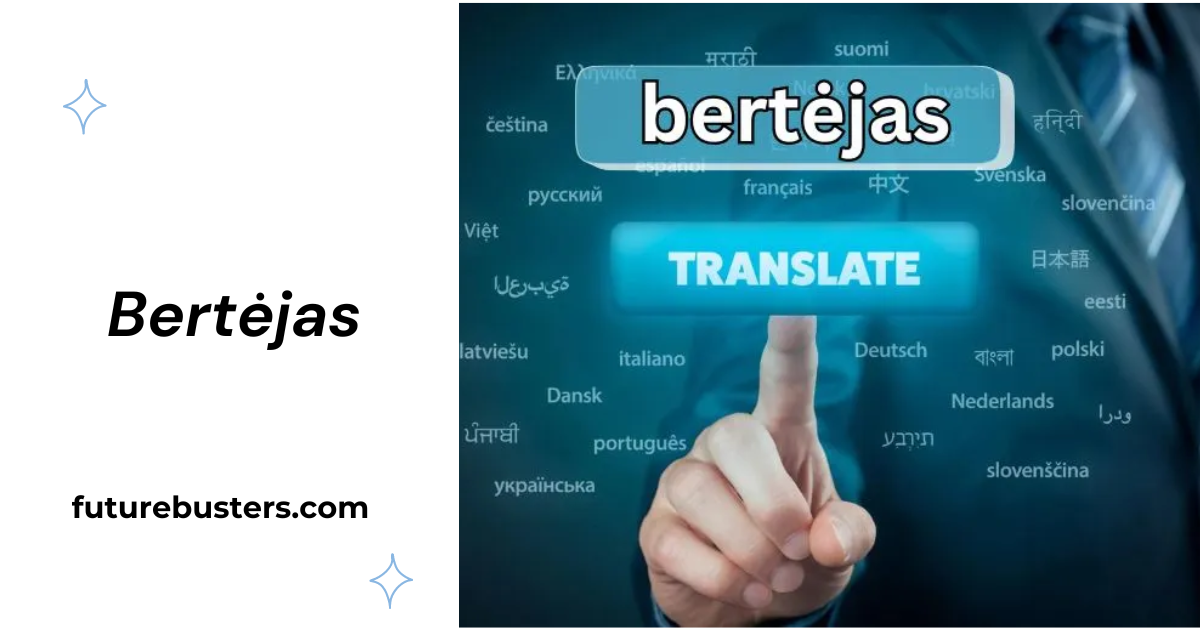Bertėjas – The Unsung Hero of Language Translation

In our increasingly interconnected world, the need for effective communication across language barriers has never been more critical. Enter the bertėjas, a term that might be unfamiliar to many but plays a crucial role in bridging linguistic divides. This comprehensive guide will explore the world of bertėjas, shedding light on its significance, functions, and impact on global communication.
What is a Bertėjas?
A bertėjas, simply put, is a translator or interpreter in Lithuanian. However, this term encompasses much more than just converting words from one language to another. A bertėjas is a linguistic expert who navigates the complex landscape of language, culture, and communication to ensure clear and accurate understanding between parties speaking different languages.
The Role of a Bertėjas in Modern Communication
In today’s globalized society, the bertėjas serves as a vital link in various sectors:
1. Business and Commerce
– Facilitating international trade negotiations
– Translating contracts and legal documents
– Interpreting during business meetings and conferences
2. Diplomacy and International Relations
– Assisting in diplomatic talks and summits
– Translating official documents and treaties
– Providing simultaneous interpretation during international events
3. Education and Research
– Translating academic papers and research findings
– Interpreting at international conferences and symposiums
– Facilitating cross-cultural educational exchanges
4. Entertainment and Media
– Subtitling and dubbing foreign films and TV shows
– Translating books and literary works
– Interpreting for international celebrities and performers
5. Healthcare and Medicine
– Assisting in doctor-patient communication for non-native speakers
– Translating medical documents and research papers
– Interpreting during international medical conferences
The Bertėjas Toolkit: Essential Skills and Qualities
To excel in their role, a bertėjas must possess a unique set of skills and qualities:
1. Language Proficiency
A bertėjas must have an exceptional command of both the source and target languages, including nuances, idioms, and cultural references.
2. Cultural Awareness
Understanding the cultural context of both languages is crucial for accurate and culturally sensitive translations.
3. Subject Matter Expertise
Specializing in specific fields like law, medicine, or technology allows a bertėjas to handle complex terminology and concepts.
4. Adaptability
The ability to switch between different translation modes (written, simultaneous, consecutive) is essential.
5. Technological Savvy
Proficiency in translation software, computer-assisted translation (CAT) tools, and other relevant technologies is increasingly important.
6. Ethical Standards
Maintaining confidentiality, impartiality, and professionalism is paramount in the bertėjas profession.
The Evolution of the Bertėjas Profession
The role of the bertėjas has evolved significantly over time:
1. Ancient Times
Early translators and interpreters played crucial roles in trade, diplomacy, and religious exchanges.
2. Middle Ages
Translators were instrumental in preserving and spreading knowledge during the European Renaissance.
3. Industrial Revolution
The growth of international trade increased the demand for professional translators and interpreters.
4. 20th Century
The establishment of international organizations like the UN created new opportunities for bertėjas professionals.
5. Digital Age
Technology has transformed the bertėjas profession, introducing new tools and methods for translation and interpretation.
Challenges Faced by Modern Bertėjas Professionals
Despite technological advancements, bertėjas professionals face several challenges:
1. Machine Translation Competition
The rise of AI-powered translation tools poses a threat to human translators.
2. Maintaining Quality Standards
Balancing speed and accuracy in an increasingly fast-paced world can be challenging.
3. Continuous Learning
Keeping up with evolving language trends and new subject matter requires ongoing education.
4. Cultural Sensitivities
Navigating complex cultural nuances and avoiding misunderstandings is a constant challenge.
5. Work-Life Balance
The demand for 24/7 availability in a globalized world can lead to burnout.
The Future of the Bertėjas Profession
As we look ahead, several trends are shaping the future of the bertėjas profession:
1. AI Collaboration
Rather than replacing human translators, AI is likely to become a powerful tool for bertėjas professionals.
2. Specialization
Bertėjas experts with niche specializations will be in high demand for complex, industry-specific translations.
3. Remote Work
The ability to work from anywhere will open up new opportunities for bertėjas professionals globally.
4. Multimedia and Localization
The growing demand for content localization across various media will create new roles for bertėjas experts.
5. Cross-Cultural Consultation
Bertėjas professionals may expand their roles to become cultural consultants for businesses and organizations.
The Impact of Bertėjas on Global Understanding
The work of bertėjas professionals goes beyond mere language translation. They play a crucial role in:
1. Fostering International Cooperation
By facilitating clear communication, bertėjas experts help build trust and understanding between nations.
2. Preserving Cultural Heritage
Through the translation of literature and historical documents, bertėjas professionals help preserve and share cultural heritage.
3. Advancing Scientific Knowledge
Accurate translation of research papers and findings allows for the global dissemination of scientific knowledge.
4. Promoting Peace and Conflict Resolution
In diplomatic settings, skilled bertėjas professionals can help prevent misunderstandings that could lead to conflicts.
5. Enhancing Global Entertainment
By making films, books, and other media accessible across languages, bertėjas experts enrich global entertainment.
How to Become a Bertėjas: Education and Career Paths
For those inspired to pursue a career as a bertėjas, here are some steps to consider:
1. Language Acquisition
Develop fluency in at least two languages, including your native tongue.
2. Formal Education
Pursue a degree in translation, interpretation, or a related field.
3. Specialization
Choose a specific area of expertise, such as legal, medical, or technical translation.
4. Certification
Obtain professional certifications to enhance credibility and job prospects.
5. Practical Experience
Gain hands-on experience through internships, volunteer work, or entry-level positions.
6. Networking
Join professional associations and attend industry events to build connections.
7. Continuous Learning
Stay updated on language trends, cultural shifts, and technological advancements in the field.
The Ethical Responsibilities of a Bertėjas
Bertėjas professionals must adhere to a strict code of ethics, including:
1. Accuracy and Fidelity
Striving for the most accurate translation possible without altering the meaning.
2. Confidentiality
Respecting the privacy of clients and maintaining the confidentiality of sensitive information.
3. Impartiality
Remaining neutral and unbiased, especially in sensitive situations like legal proceedings.
4. Professional Development
Continuously improving skills and knowledge to provide the best possible service.
5. Cultural Sensitivity
Respecting and accurately conveying cultural nuances in translations.
6. Honesty
Being transparent about qualifications and limitations, and declining assignments beyond one’s expertise.
Tools and Technologies for Bertėjas Professionals
Modern bertėjas experts utilize various tools to enhance their work:
1. Computer-Assisted Translation (CAT) Tools
Software that helps streamline the translation process and maintain consistency.
2. Translation Memory Systems
Databases that store previously translated segments for future reference and reuse.
3. Terminology Management Tools
Software for managing and standardizing terminology across translations.
4. Voice Recognition Software
Tools that convert spoken words into text, useful for transcription and interpretation.
5. Cloud-Based Collaboration Platforms
Systems that allow multiple translators to work on large projects simultaneously.
6. Quality Assurance Tools
Software that checks translations for errors, inconsistencies, and formatting issues.
The Global Demand for Bertėjas Services
The need for skilled bertėjas professionals continues to grow across various industries:
1. E-commerce and Global Marketing
As businesses expand internationally, the demand for localization services increases.
2. Healthcare and Telemedicine
The rise of remote healthcare services creates a need for medical interpreters and translators.
3. Legal and Immigration Services
Accurate translation of legal documents and interpretation services are crucial in these fields.
4. Technology and Software Localization
The global tech industry requires continuous localization of products and services.
5. International Organizations and NGOs
Multilingual communication is essential for global humanitarian efforts and international cooperation.
Conclusion: The Indispensable Role of the Bertėjas
In our increasingly interconnected world, the bertėjas stands as a crucial bridge between languages, cultures, and ideas. Far more than just word-for-word translators, these linguistic experts play a vital role in fostering global understanding, facilitating international cooperation, and preserving cultural heritage.
As we move forward in an era of rapid technological advancement and global communication, the role of the bertėjas will continue to evolve and adapt. While AI and machine translation may change the landscape of language services, the human touch, cultural insight, and specialized expertise of bertėjas professionals will remain invaluable.
By breaking down language barriers and facilitating clear communication across cultures, bertėjas professionals not only enable the exchange of information but also promote empathy, understanding, and collaboration on a global scale. As such, the bertėjas profession stands as a testament to the power of language and the enduring importance of human connection in our digital age.
FAQs About Bertėjas
What exactly does a bertėjas do?
A bertėjas is a professional translator or interpreter who converts written or spoken content from one language to another, ensuring accurate and culturally appropriate communication.
How is a bertėjas different from a regular translator?
While “bertėjas” is the Lithuanian term for translator, it often implies a higher level of expertise and cultural understanding beyond mere word-for-word translation.
Do I need a special degree to become a bertėjas?
While not always mandatory, a degree in translation, interpretation, or a related field can greatly enhance your skills and job prospects as a bertėjas.
Can machine translation replace human bertėjas professionals?
While machine translation has improved, it cannot fully replace human bertėjas professionals, especially for complex or culturally nuanced content.
What industries have the highest demand for bertėjas services?
Legal, medical, technical, and literary fields often have high demand for specialized bertėjas services.
How much does a professional bertėjas typically earn?
Earnings can vary widely based on specialization, experience, and location, but skilled bertėjas professionals can command competitive salaries.
Is it necessary for a bertėjas to be fluent in more than two languages?
While proficiency in two languages is the minimum, many bertėjas professionals are multilingual, which can increase their versatility and job opportunities.
What’s the difference between a bertėjas and an interpreter?
A bertėjas typically refers to both translators (who work with written text) and interpreters (who work with spoken language), though some may specialize in one or the other.
How long does it take to become a proficient bertėjas?
Becoming proficient can take several years of study and practice, including language acquisition, cultural learning, and specialization in specific fields.
Are there international certifications for bertėjas professionals?
Yes, there are various international certifications available, though requirements may vary by country and specialization.











